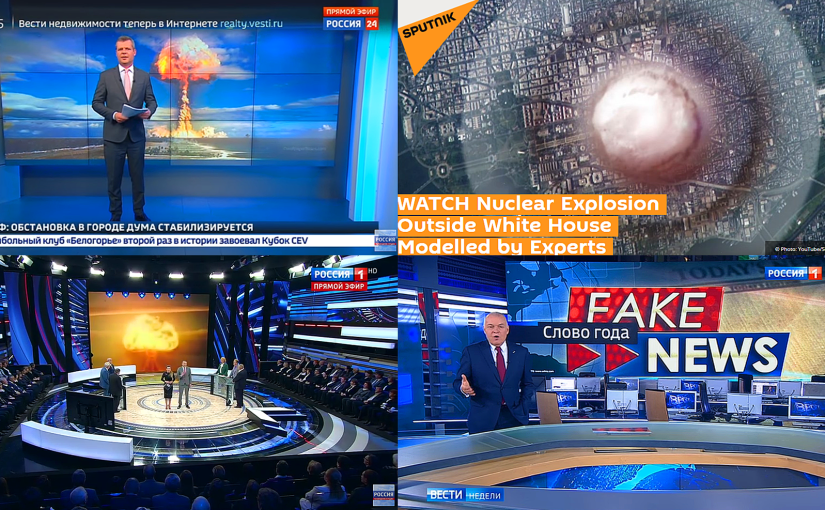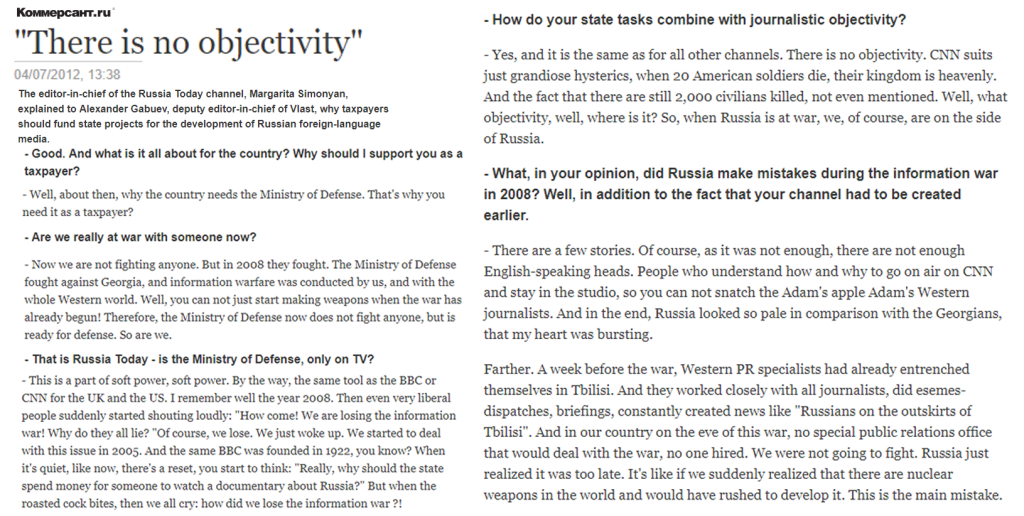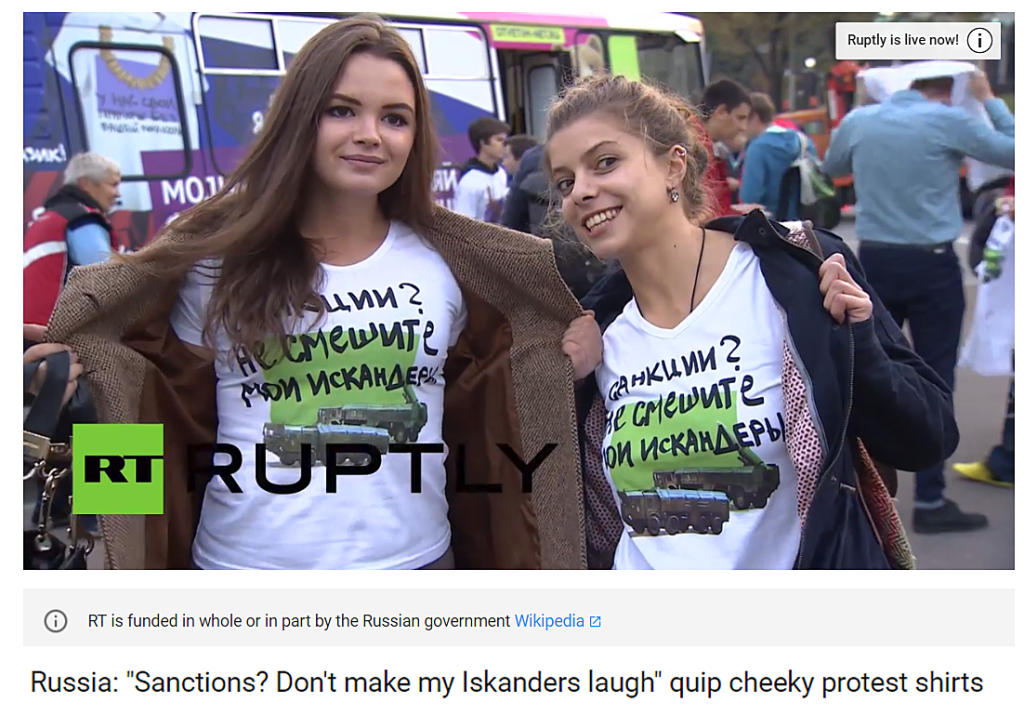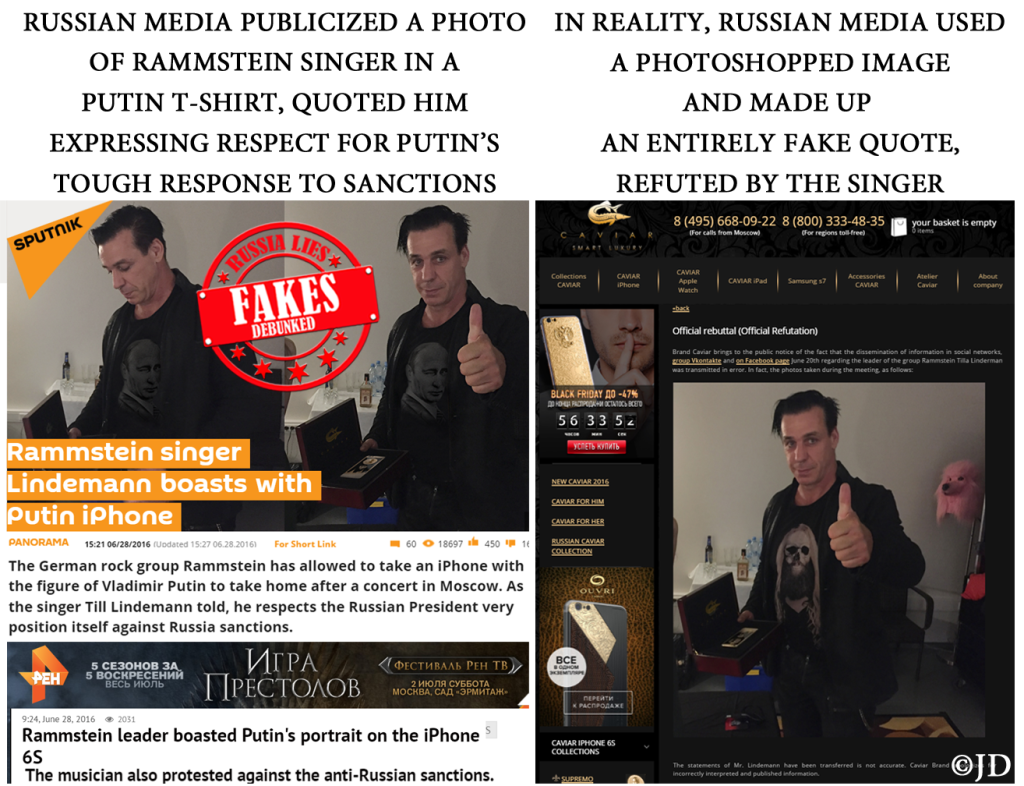Russia’s English-speaking media and government representatives would have you believe they’re on the defensive, fending off the West’s attacks in the info-sphere. However, their real point of view emerges in Russian-speaking media, where the Kremlin’s mouthpieces boast of winning the info-war against the West.
After airing Fox News clip of Rand Paul, questioning who is really behind the chem attack in #Syria, #Russia's state TV host says that Russia is winning the info-war. Former Russian Dep Minister of Defense Andrei Kokoshin points out that RT plays a big part in fighting info-wars. pic.twitter.com/rFQYshtf7C
— Julia Davis (@JuliaDavisNews) April 19, 2018
#Russia's state TV: MFA spokeswoman Maria Zakharova says that Washington, DC and the U.S. establishment realize they can't keep up with – much less to combat – "info-victories" by the Russian state media (RT, Sputnik, RIA, VGTRK, Tass). pic.twitter.com/x7PTwSAw9y
— Julia Davis (@JuliaDavisNews) November 9, 2017
#Russia's state TV:
State Duma Deputy Speaker Irina Yarovaya says that weapons of information warfare are more dangerous than nukes and should be considered weapons of mass destruction. pic.twitter.com/68ELlfW0es— Julia Davis (@JuliaDavisNews) March 13, 2018
The Kremlin’s reaction to Trump’s Syria strikes could be dissected to examine the modus operandi utilized by the Russian state media to conduct successful info-ops.
Step 1: Laying the groundwork
Whenever possible, the Kremlin and the Russian state media attempt to preemptively muddy the waters with respect to any potentially sensitive topic. When certain events are inevitable, the Kremlin predicts them in a way most beneficial to the regime. For example, Putin warned about possible “chemical weapons provocations by the rebels,” knowing Assad’s propensity for using them. Thus, such a warning is an evergreen fig leaf, to be used by the Kremlin as needed.
With respect to Trump’s motives, impugning them was easy. Once Trump Tweeted out his intent to conduct a series of strikes on Syria, the Russian state media asserted that Trump ordered the strikes to distract from the raid of his attorney’s office, his alleged affair with Stormy Daniels and Mueller’s investigation in general. This was a low-hanging fruit and the Kremlin plucked it with great ease – convincing not only domestic audiences, but also those in the West.
#Russia's state TV:
Politician Sergey Stankevich says Trump decided to conduct a strike on #Syria on the same day his lawyer's offices were raided. Stankevich says: "Taking Trump’s behavior and fatal ineptitude into consideration, they likely found all sorts of things." pic.twitter.com/SEqhruWqrE— Julia Davis (@JuliaDavisNews) April 10, 2018
In a more general sense, the Kremlin has been laying the groundwork for its info-ops against the West for years, developing the general mistrust of the government and media. RT’s editor-in-chief, Margarita Simonyan, admitted that RT was created as an instrument to be used by the Kremlin for its info-wars against the West, as needed.
Simonyan elaborated that it would be too late to start making weapons once the war has already started. Thus, RT was conceived, masquerading as an “alternative news” media outlet, to be used as needed. Simonyan explained: “When Russia is at war, we [RT] are on Russia’s side.”
#Russia's state TV: MFA spokeswoman Maria Zakharova admits outright that RT/Sputnik were formed as a weapon to fight info-wars against the West. pic.twitter.com/X31iE3yRwc
— Julia Davis (@JuliaDavisNews) November 9, 2017
For years, RT has been cultivating the soil: covering demonstrations and protests, interviewing whistleblowers and fringe politicians, developing trust with the audience by covering stories ignored by the mainstream media. When Russia invaded Ukraine in 2014, RT was weaponized, spewing out blatant propaganda and outright fakes to the receptive audience that has grown to trust them over the years. The Russian media churned out hundreds of fake stories, shared on social media by Kremlin trolls, bots and – perhaps most importantly – those who genuinely believed them. Margarita Simonyan continues to boast about RT’s successes, exclaiming that “soft power” works and the Kremlin needs to continually build it up, because people in the West “are listening and taking it in.”
In the meantime, the West is lagging far behind, having been caught unprepared for the onslaught of the fake news, encompassing a wide variety of topics, from Ebola to the election. While the Congress has allocated $120 million since 2016 to combat foreign propaganda, none of it was spent to counter foreign efforts to meddle in elections or sow distrust in democracy.
#Russia's state TV: Politicians concur that #Russia has been at war with the U.S. for the last 4 years, w/ Ukraine, Syria as the main theaters of war; blame oligarchs for keeping their money in the West, failing to mobilize their personal & corporate resources per Putin's orders. pic.twitter.com/PPQ5iMxDPp
— Julia Davis (@JuliaDavisNews) April 10, 2018
Step 2: Ratcheting up the pressure
Who wouldn’t want to get along with Russia, if the only alternative was to end up reduced to a pile of radioactive ash? That’s how the Kremlin’s mouthpieces aim to make you feel. This is not a new narrative, but a trusty saber that is being rattled as needed.
Kiselyov excitedly quotes Nat'l Interest, corresponding w/ his rhetoric: Russia is the only country that can reduce US to radioactive ashes. pic.twitter.com/KAHayj03l9
— Julia Davis (@JuliaDavisNews) October 9, 2016
#Russia's state TV: Top propagandist, Dmitry Kiselyov: "Unlike America that keeps going crazy about world domination, Russia has a different plan for the United States: we need a strong defense, with a guarantee that our retaliatory strike will reduce the U.S. to radioactive ash. pic.twitter.com/Cvw9M5QOtr
— Julia Davis (@JuliaDavisNews) December 25, 2017
#Russia's state TV:
Top propagandist Dmitry Kiselyov (notorious Mr. "Russia can reduce the U.S. to radioactive ash") says that the U.S. will be forced to negotiate with Russia, since it's in America's "existential interests" to do so — and no longer from a position of strength. pic.twitter.com/zPvuH1wS5B— Julia Davis (@JuliaDavisNews) March 11, 2018
#Russia's top propagandist, Dmitry Kiselyov, says that he participated in Putin's weapons-naming contest. Kiselyov says he suggested the missile be named "Ash"—clearly referring to his previous statement that Russia is the only country that can reduce the U.S. to radioactive ash. pic.twitter.com/bpZArHl7VG
— Julia Davis (@JuliaDavisNews) March 25, 2018
#Russia's state TV discusses @WSJ report that Trump's original plan included strikes on Russian air defenses in #Syria. Alexander Losev (member of Russian Council on Foreign & Defense Policy), says that in that case, 500 million Europeans wld have been reduced to radioactive ash. pic.twitter.com/dAzUfZlcYa
— Julia Davis (@JuliaDavisNews) April 16, 2018
Simply put, Russia believes it should be able to get away with anything, because it is a nuclear power to be reckoned with. For example, in anticipation of the recent Syria strikes, the Kremlin and its mouthpieces poured out a series of dire warnings. Russia’s ambassador to Lebanon, Alexander Zasypkin, warned that Russia would fire not only on any U.S. missiles targeting Syria, but also the units launching them. This threat was echoing the warning previously issued by Valery Gerasimov, head of Russia’s armed forces: “In case the lives of our soldiers are under threat, the armed forces of the Russian Federation will take retaliatory measures . . . against missiles and against the delivery vehicles used.”
Russian state TV posted videos, explaining what to take with you to the bomb shelter in case of a nuclear attack, as well as simulations of a “Nuclear Explosion Outside White House.”
#Russia's state TV tells everyone not to panic, but nonetheless provides handy guidance on "What to take to the bomb shelter."#ThisIsFine pic.twitter.com/LVr5iU0EO2
— Julia Davis (@JuliaDavisNews) April 11, 2018
Meanwhile in #Russia's state media: pic.twitter.com/x4apy08AIU
— Julia Davis (@JuliaDavisNews) April 17, 2018
The Kremlin wants the average Western citizens to be so exhausted by the possibility of World War III that they would pressure their governments to get along with Russia, at any cost. That is the strategy frequently discussed on Russian state television, as well as the main aim of the nuclear saber-rattling.
Step 3: Taking full advantage of the situation
In any scenario, the Kremlin’s media tentacles reach into the public conscience and build the momentum for the actions Putin’s government has been contemplating all along. For example, the Ukrainian revolution was used as the pretext for annexing Crimea, which was quietly contemplated for years. The idea of providing S-300 or S-400 anti-aircraft missile systems to Assad has been floated in the Russian state media prior to the strikes. Russian pundits and politicians publicly relished the idea of turning Syria into another Vietnam for Americans.
#Russia's state TV:
State Duma deputy Leonid Kalashnikov says Russia should supply S-300, S-400 to Assad, the same way the USSR sent surface-to-air missiles to Vietnam, and let #Syria knock American bombers out of the sky.
cc: @realDonaldTrump #RussiaIsNotOurFriend pic.twitter.com/JNGP1Dg1fS— Julia Davis (@JuliaDavisNews) April 10, 2018
Nonetheless, the strikes are now being used as the pretext for “removing moral obligations” not to supply Assad with such systems. In short, Russia is prepared to use any situation to further its prior objectives, with the media working to provide the perceived justification, while clouding the collective conscience.
When Russia’s election meddling was widely exposed – instead of shying away from the topic, the Kremlin’s state media openly boasted: “Trump is ours”!
#Russia's state TV: Alexander Losev, Member of the Presidium of the Russian Council on Foreign and Defense Policy, says that Trump had nothing to do w/ authoring #NSS2017, which was written 2 years ago.
Host adds: "Because Trump is ours. He wouldn't have anything to do with it." pic.twitter.com/FrC5FOdvLW— Julia Davis (@JuliaDavisNews) December 19, 2017
#Russia's state TV:
Female host: "Seemingly, Trump is ours again. So far, he's being quiet and not supporting the sanctions."
Male host: "Well, it seems that way." pic.twitter.com/R9Wu5kYwkR— Julia Davis (@JuliaDavisNews) January 30, 2018
#Russia's state TV:
For the umpteenth time, Russian state TV host exclaims "Trump is ours."
Olga Skabeeva:
"Yesterday, Tillerson supported Theresa May in her 'highly likely' [#Skripal poisoning] allegation. So Trump immediately fired him. Trump is ours!" pic.twitter.com/86WJgPGWmL— Julia Davis (@JuliaDavisNews) March 14, 2018
#Russia's state TV mocks American intelligence services:
MP Vyacheslav Nikonov says U.S. spies slept while Russia elected a U.S. President. pic.twitter.com/BmMNBTr41R— Julia Davis (@JuliaDavisNews) September 11, 2017
#Russia's state TV: Politician Nikita Isaev says that after phone convo w/ Putin, Trump is now being portrayed as someone who is good for U.S. economy and is helping Russia to fight against terrorism— whereas before the Russians were told the opposite. "Now, Trump is ours again." pic.twitter.com/4jgAA2yeWI
— Julia Davis (@JuliaDavisNews) December 18, 2017
#Russia's state TV addresses Trump's "soft approach," "strange Kremlin List" and non-implementation of #sanctions, which reinforces the Russian belief that "Trump is ours" (#ТрампНаш). pic.twitter.com/OkTS0i2aDW
— Julia Davis (@JuliaDavisNews) January 30, 2018
Russian politicians and pundits are continuing to reiterate that Trump is the most pro-Russian politician in the U.S. establishment.
#Russia's state TV:
Russian parliamentarian Vyacheslav Nikonov (Molotov's grandson) says:
"Trump is the most pro-Russian politician in the American establishment." pic.twitter.com/9Fk7Az3014— Julia Davis (@JuliaDavisNews) April 20, 2018
The Russians are already being sanctioned for election meddling and don’t have much to lose by using the situation to their advantage, thus cementing the idea of Putin’s omnipotence and Russia’s growing worldwide influence.
Step 4: Claiming moral superiority
In every large-scale confrontation, Russia is positioning itself as the brave Soviet soldier and its opponents as the Nazis. The Kremlin is repeatedly engaging in large-scale demonstrations of Godwin’s law: invoke the Nazis and you’ve lost the argument. Undeterred by this principle, the Russians continue to resort to this tactic. Ukrainians opposing Russian aggression are labeled as the Nazis and Trump, who approved the strikes on Syria, is the new Hitler.
#Russia’s state media quotes Russian lawmaker Sherin : "The US President Donald Trump is not just a criminal for the whole world, he is Adolf Hitler number two.”#Syria pic.twitter.com/nMaYrRTQsb
— Julia Davis (@JuliaDavisNews) April 14, 2018
The Russian media, having threatened to reduce the world to piles of radioactive ash, says that silly Trump is “playing toy soldiers” and trying to start WWIII, but “wise and calm” Putin saved the world by not responding. Politicians and pundits propose a variety of retaliatory measures, including expanded information warfare operations.
#Russia's state TV:
Deputy of the Russian Duma Alexei Zhuravlev says Russia will win in #Syria, if it widens its presence and retaliates on info-front [likely meaning propaganda, disinfo and kompromat]. pic.twitter.com/CPFU2ql6EW— Julia Davis (@JuliaDavisNews) April 15, 2018
Step 5: Declaring victory in the face of defeat
Russia claims to be winning, regardless of the facts on the ground. When the West imposed the sanctions for the annexation of Ukraine’s Crimea, the Russian media portrayed them as a measure that is good for Russia and bad for the West. Russian state media promoted T-shirts that said: “Sanctions? Don’t make my Iskanders laugh.” “Iskander” is a missile complex, capable of carrying a nuclear warhead. The typical message of defiance was combined with the customary nuclear saber-rattling. The Iskanders no longer seem to be laughing, as the sanctions are biting hard, but first impressions do count.
The same principle was utilized to address the Syria strikes. Trump’s decision to strike hardly pleased the Putin’ regime, but the media managed to portray the entire operation as a resounding success for Russia and Assad. State media rejoiced that the Assad regime evacuated and emptied all of the facilities targeted by strikes and described the operation as the U.S. and allies “hitting some empty barns.”
#Russia’s state TV says the Assad regime spent this week evacuating the facilities targeted by the U.S. & allies’ strikes.#Syria pic.twitter.com/rRblJesDEG
— Julia Davis (@JuliaDavisNews) April 14, 2018
By the same token, when the Trump administration announced its decision to expel 60 Russian spies from the U.S., the Russian state media was quick to point out that an unidentified senior Trump administration official reportedly comforted the Russians by telling them that the number of Russian diplomatic staff in the U.S. is not being cut and 60 expelled spies could be replaced by others.
#Russia's state media quotes an unidentified senior Trump administration official, who reportedly said that the number of Russian diplomatic staff in the U.S. is not being cut (60 expelled spies could be replaced by others). pic.twitter.com/AXDmcjxjFh
— Julia Davis (@JuliaDavisNews) March 30, 2018
The Russian media took full advantage of the situation, mocking the move as a hollow gesture.
#Russia's state TV refers to Trump's "expulsion" of Russian spies/"diplomats" as a simple "rotation," since the same number of spies will be allowed to return as their replacements. pic.twitter.com/7K8wROtPgD
— Julia Davis (@JuliaDavisNews) April 3, 2018
#Russia's state TV is having fun at our expense about senior Trump admin official "whispering into their ear" that Russia can replace 60 expelled Russian spies with 60 others. Female host sarcastically says: "We'll send some new, harmless ones – decent people and not even spies." pic.twitter.com/kWSJOKTpe8
— Julia Davis (@JuliaDavisNews) March 30, 2018
#Russia's state TV keeps having fun with the revelation that 60 Russian spies expelled from the US can be replaced with 60 others. Vladimir Soloviev, who likes to brag of his close ties to Putin, asks:
"Can we send them the ones expelled from the UK and Europe?"
[Audience claps] pic.twitter.com/YySE6EIzPf— Julia Davis (@JuliaDavisNews) April 5, 2018
Step 6: Escalating influence operations
Russia’s use of bots and trolls has been extensively covered in the media. One aspect of Russia’s info-war operations includes the creation of anonymous social media accounts, purporting to “uncover” covert pro-Kremlin operators and trolls, while striving to attack those who debunk Russian propaganda, to splinter the “resistance” and to undermine pro-Ukrainian movements in the social media. Any accounts that attack anti-Kremlin individuals under the guise of “exposing them” should be taken with a pound of salt. While these underhanded tactics yield some fruit, the key to the Kremlin’s info-wars is convincing and/or recruiting real celebrities and large-scale influencers to openly run with the Russian version of the narrative.
Not earth-shattering to most, but today’s #Russia state TV program 60 Minutes discussed info-wars in decent detail, incl convincing influencers, celebrities & Western populace of Russia’s talking points, ultimately leading to election of politicians w/ views beneficial to Russia. pic.twitter.com/8XLQVDfmqj
— Julia Davis (@JuliaDavisNews) April 19, 2018
In the past, Russian state media simply used Photoshopped images to project the idea of celebrities supporting Putin. For example, Sputnik and other Russian state media outlets published a story that quoted Rammstein singer Till Lindemann, allegedly speaking out in support of Putin and lashing out against Western sanctions. According to Sputnik, Lindemann said that Putin is more popular in Germany than Angela Merkel. Sputnik also published a Photoshopped picture of the singer in a Putin T-shirt.
Photoshop isn’t necessary, when Russia can recruit or use real influencers or celebrities. Appearing on Russian state TV show ’60 Minutes,’ RT’s editor-in-chief Margarita Simonyan said, in relevant part: “Regular people – among whom there are people who have more influence on public opinion than the government – they are the ones we’re trying to reach. Look at Roger Waters of Pink Floyd… Those are the people who have nowhere else to find this information, except for us [RT].” During his Barcelona concert, Waters denounced “the White Helmets” as a “fake organization,” much to the delight of the Russian state media. He later provided copies of e-mail communications to be used by RT in its programming.
 After bringing up Waters, Simonyan boasted about her discussions with an unnamed top-level manager of a major international multimedia platform. She proudly claimed to have convinced this high-ranking individual [presumably, an American] to accept the Kremlin’s perspective on the annexation of Crimea. “He didn’t know anything about it, but now he understands,” Simonyan said. She emphasized the importance of spreading the Russian narrative in multiple languages, which is currently being done only by RT and Sputnik (sister companies, with Simonyan serving as the editor-in-chief of both).
After bringing up Waters, Simonyan boasted about her discussions with an unnamed top-level manager of a major international multimedia platform. She proudly claimed to have convinced this high-ranking individual [presumably, an American] to accept the Kremlin’s perspective on the annexation of Crimea. “He didn’t know anything about it, but now he understands,” Simonyan said. She emphasized the importance of spreading the Russian narrative in multiple languages, which is currently being done only by RT and Sputnik (sister companies, with Simonyan serving as the editor-in-chief of both).
As the Kremlin increases its info-war operations, another English-language “media” company is about to appear on the Western front. “USA Really” was created by Russia’s Federal News Agency, linked to the IRA troll factory operations. The stated goal of “USA Really” is to spread “information and problems that are hushed up” by the American mainstream media. It is essentially the same model that has proven to be quite effective for RT and Sputnik.
#Russia’s Federal News Agency (linked to the IRA troll factory, blocked by Facebook) is creating another weapon of info-war against the U.S., entitled "USA Really" – essentially, RT on steroids. Its stated goal is to spread "information and problems that are hushed up" by US MSM. pic.twitter.com/9KUhAInIH0
— Julia Davis (@JuliaDavisNews) April 5, 2018
Trump’s narrative about the untrustworthy “fake news media” plays right into the hands of the Kremlin’s bullhorns. By undermining public trust in traditional news sources, Russian state media promotes itself as an “alternative” source of news. As an expression goes, “If you build it, they will come” and if you write it, they will believe – as Margarita Simonyan opined during one of her many appearances on Russian state media talk shows.
AP interviews RT's Margarita Simonyan, who claims that all of the U.S. media working in Russia is biased. She adds: "Your own president thinks that almost all of your media is fake."#ThanksTrump pic.twitter.com/YRqWnCoDKl
— Julia Davis (@JuliaDavisNews) January 22, 2018
#Russia's state TV: Top propagandist, Dmitry Kiselyov, calls all info about Russian aggression #FakeNews, predicts it to be "the word of the year" [two words, actually] in 2018. pic.twitter.com/2EUq4zkxb1
— Julia Davis (@JuliaDavisNews) December 26, 2017
RT's editor-in-chief Margarita Simonyan says that Trump calls CNN "the fake news channel," was planning to—and could have— closed them down. pic.twitter.com/5uRDETlZxz
— Julia Davis (@JuliaDavisNews) October 16, 2017
#Russia's state TV:
RT's editor-in-chief, Margarita Simonyan, claims that "Americans elected Trump because he wanted to be friendly with Russia and Putin." She says the U.S. populace was influenced by the likes of RT/Sputnik, emphasizes the need for more weapons of "soft power." pic.twitter.com/iquh2Lbsfh— Julia Davis (@JuliaDavisNews) April 5, 2018
The Western audiences are so receptive to the Russian propaganda in large part due to the dismal media coverage of the Kremlin in the recent past. Many Americans are blissfully unaware that Putin’s Russia is not our friend and is hoping for our ultimate destruction.
#Russia's state TV: Dep. Dean of World Politics at Moscow's State University:
"Unfortunately, Trump didn't reach the level of Abraham Lincoln & didn't drive the U.S. to civil war. That's sad. Hopefully, he'll become Herbert Hoover and at least drive them into a Great Depression." pic.twitter.com/rc5I9UYXxZ— Julia Davis (@JuliaDavisNews) February 11, 2018
#Russia's state TV—Professor of RF Academy of Mil Sciences:
When we learn how to cause them [U.S.] real pain, they'll learn to respect us. pic.twitter.com/uUQb5bU3Kk— Julia Davis (@JuliaDavisNews) September 1, 2017

Editor-in-chief of RT and Sputnik, Margarita Simonyan, isn’t striving to bring you the “alternative news.” She’s working hard to fill the information space with propaganda, while asserting that Americans are so dumb and uneducated, they’ll believe anything. It’s not a coincidence that RT and Sputnik have such a hard time finding anything remotely positive to report about the U.S.
RT's editor-in-chief Margarita Simonyan: Americans have such low education/knowledge levels — below the baseboard— they'll believe anything. pic.twitter.com/KhiXJmYSTd
— Julia Davis (@JuliaDavisNews) October 16, 2017
RT's editor-in-chief Margarita Simonyan was stumped when she was asked to give an example of anything good RT reported about the U.S. in the recent past. She couldn't come up with a single example. Telling. pic.twitter.com/afaopv1W0z
— Julia Davis (@JuliaDavisNews) November 10, 2017
RT's editor-in-chief Simonyan recounts how she refused to recite the pledge of allegiance in a U.S. school, criticizes it as indoctrination. pic.twitter.com/QhluAuQjJU
— Julia Davis (@JuliaDavisNews) October 16, 2017
RT's editor-in-chief mocks Americans on state TV: "Their level of knowledge is lower than the baseboard, most can't find Russia on the map." pic.twitter.com/v2bZBYqtPk
— Julia Davis (@JuliaDavisNews) October 4, 2017
It should be noted that without a willing participant in the White House, the Kremlin’s info-ops would be notably less effective. Trump’s “fatal ineptitude” (a fitting expression, coined on a Russian state TV show ’60 Minutes’) is a deciding factor that fits into the pyramid of convincing lies like a missing piece of a puzzle. Trump’s continued kowtowing to the Russians puts a cherry atop a poisoned ice cream sundae of Putin’s propaganda. Without adequate countermeasures, Russian information warfare will continue to advance.





2 thoughts on “Russia Boasts It Is Winning Info-Wars Against the West”
Comments are closed.